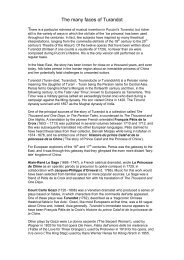NEF-Southampton-Positive-Money-ICB-Submission
NEF-Southampton-Positive-Money-ICB-Submission
NEF-Southampton-Positive-Money-ICB-Submission
Create successful ePaper yourself
Turn your PDF publications into a flip-book with our unique Google optimized e-Paper software.
(allowing for a small degree of variaGon due to defaults and late payments).<br />
Consequently, the bank’s computer systems will be able to easily calculate how much money should be<br />
required on any parGcular day up to 12 months into the future. If it idenGfies any potenGal cashflow<br />
problems (such as a large number of Investment Accounts maturing in a short period of Gme and insufficient<br />
income from loan repayments to cover them all) the bank can rein in loan-‐making acGvity unGl it has built up<br />
a buffer to cover the upcoming shoryall. On the other hand, if the cashflow forecasts idenGfy a period when<br />
repayments from exisGng borrowers are in excess of the amounts required to repay Investment Account<br />
holders, it can increase loan making acGvity to ensure that it does not end up with a swelling Investment Pool<br />
Account full of ‘idle’ funds.<br />
This degree of forward planning and predictability is impossible within the current fracGonal reserve banking<br />
system.<br />
It should be noted that there are sGll risks of a ‘slow-‐moGon bank run’ with full-‐reserve banking. For instance,<br />
rumours of a bank’s insolvency may cause all customers with minimum noGce period Investment Accounts to<br />
serve their minimum noGce period and withdraw their funds at the earliest opportunity. However,<br />
considering that all demand liabiliGes are now held off the balance sheet and are not backed by risky assets,<br />
the impact of this slow-‐moGon bank run would be very manageable in contrast to a run on fracGonal reserve<br />
banks, and would be unlikely to pose any threat to the wider financial system, in contrast to a run (or ‘silent<br />
run’ 21 ) on any fracGonal reserve bank.<br />
APPENDIX 3: Investment Account Guarantees<br />
Under the exisGng system, if a bank fails due to bad investments, a third party (the taxpayer) will reimburse<br />
the savers who had money invested with that bank.<br />
This creates a few serious flaws or ‘distorGons’ in the economic system:<br />
1. It means that the banks can gamble with their customers’ money in the knowledge that the government<br />
will step in to cover any serious losses. This creates ‘moral hazard’ and encourages the banks to take greater<br />
risks in their investments.<br />
2. It means that one group stands to benefit if the bank is successful in its investments, while another group<br />
(taxpayers) stands to lose if the bank is unsuccessful. The government-‐backed guarantee on funds in any UK<br />
bank account means that bank account customers do not need to pay any aOenGon to the acGviGes of the<br />
bank that they choose to invest with. If customers bear at least some of the risk of the investment, it should<br />
encourage them to be more vocal in how the banks invest their money – maybe expressing concern that large<br />
sums of money go into risky proprietary trading, or requesGng accounts where the money is ring-‐fenced for<br />
certain types of investment.<br />
Our proposal contains a few simple rules that collecGvely ‘fix’ these fundamental problems in the current<br />
design of the banking system. PracGcally, it works as follows:<br />
1. A bank has the opGon of offering Investment Account holders a guarantee that they will be repaid a<br />
21 A ‘silent run’ occurs where, in contrast to a panicked a:empt of depositors to withdraw money as soon as possible, investors and<br />
lenders to the bank simply choose not to rollover or renew their lending to the bank. For a bank relying on short term wholesale<br />
funding, this can be fatal.<br />
33



